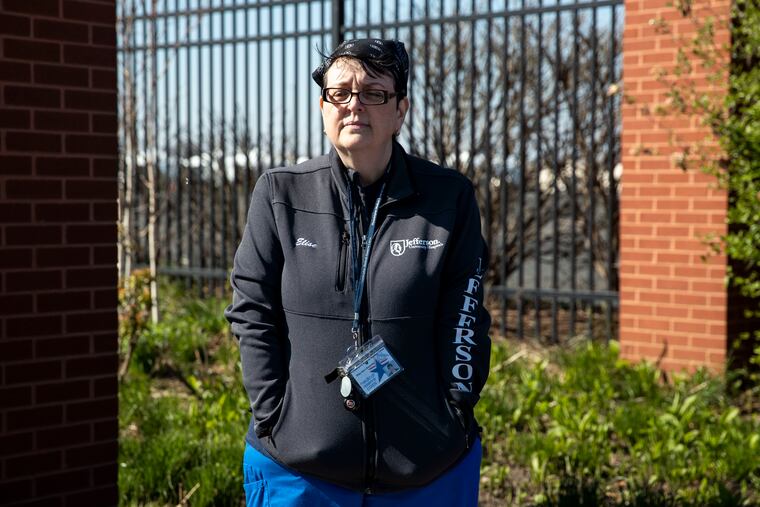These are the volunteers helping test for COVID-19 in South Philadelphia
Several dozen members of Philadelphia’s medical reserve corps are helping to staff COVID-19 testing site run by the city.

Elise Dorr-Dorynek doesn’t have days off anymore.
Since the coronavirus outbreak descended on Philadelphia, Dorr-Dorynek has split time between her day job as a nurse at Jefferson Health and a volunteer at the city’s COVID-19 testing site, swathed in personal protective equipment and swabbing patients for hours in a tent in the parking lot of Citizens Bank Park.
She’s one of several dozen members of Philadelphia’s medical reserve corps who are helping to staff the testing site — an all-volunteer group of medical and nonmedical professionals who act as backup for the city health department during health crises and large-scale events. Formed after the Sept. 11 attacks, several hundred units of the corps exist around the country. Dorr-Dorynek was one of the first to sign up when Philadelphia’s branch launched.
“I wanted to be able to help my community," she said.
But she’s never been asked to help her community like this. She helped staff field hospitals during the papal visit in 2015 and worked the Democratic National Convention in 2016. She administered vaccines to children during the H1N1 outbreak in 2009 and helped distribute flu vaccines to first responders. But the COVID-19 pandemic is different — in both the nature and tenor of the work.
“I’ve never done clinical testing en masse,” Dorr-Dorynek said. “And this is just scarier. People are nervous.”
Assuaging those fears, even if just for a moment, has become part of her job at the site, too. She soothes patients as they gag through the painful nasal swab test and reassures them they’ll be on their way as quickly as possible. She tells them they’re brave.
“Mostly, we give information,” said John Muccitelli, a nurse who teaches at Jefferson and is also volunteering with the corps at the testing site. “People are anxious, nervous, wanting to know how long [the test results] will take.”
The patients who come by the site don’t need a doctor’s note or referral to visit, but tests are limited to people over age 50 and health-care professionals who are experiencing COVID-19-like symptoms. Because test results take several days to come back, the corps volunteers “kind of have to assume everyone is positive” while they interact with patients, Muccitelli says. They wear gowns, masks, face shields, and gloves — the supply of protective equipment has, so far, not run low — and advise patients on how to avoid spreading the virus to others.
Both Muccitelli and Dorr-Dorynek are aware of their own risks of catching the virus and are working to keep themselves and their loved ones safe. Dorr-Dorynek, whose husband has a spinal cord injury and is more at risk for the virus, has been washing her work clothes in the hottest water possible immediately upon arriving home. Muccitelli, 67, is taking his temperature twice a day, and as a nurse has long been accustomed to intensive hand sanitizing. “I’m [among] the most at-risk people to catch this,” he said, referring to health-care workers and those over 65. “So we take care.”
Muccitelli said he joined the corps because he wanted to give back to the city, too. “I love this city. I love the people,” he said. “They need us, and we’re here.”
When the health department asked the corps to help staff the testing center and called for more volunteers, Muccitelli forwarded the request to his nursing classes. He’s been especially gratified, he said, to run into former students who graduated, became nurses, and joined the corps themselves. Nonmedical professionals are welcome, too, he said: The corps needs help organizing lines and handling logistics at the testing center. Anyone over the age of 18 can join the corps by applying online.
“We’re like resource expanders,” he said. “And the more members we have, the more people they can call in.”